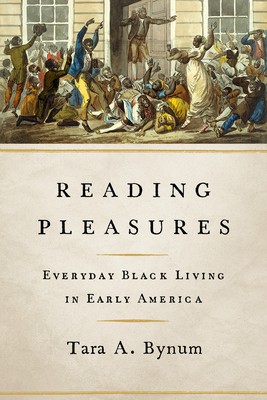
- We will send in 10–14 business days.
- Author: Tara A Bynum
- Publisher: University of Illinois Press
- ISBN-10: 025208683X
- ISBN-13: 9780252086830
- Format: 15 x 22.6 x 1.6 cm, minkšti viršeliai
- Language: English
- SAVE -10% with code: EXTRA
Reviews
Description
In the early United States, a Black person committed an act of resistance simply by reading and writing. Yet we overlook that these activities also brought pleasure. Tara A. Bynum tells the compelling stories of four early American writers who expressed feeling good despite living while enslaved or only nominally free. The poet Phillis Wheatley delights in writing letters to a friend. Ministers John Marrant and James Albert Ukawsaw Gronniosaw memorialize their love for God. David Walker's pamphlets ask Black Americans to claim their victory over slavery. Together, their writings reflect the joyous, if messy, humanity inside each of them. This proof of a thriving interior self in pursuit of good feeling forces us to reckon with the fact that Black lives do matter.
A daring assertion of Black people's humanity, Reading Pleasures reveals how four Black writers experienced positive feelings and analyzes the ways these emotions served creative, political, and racialized ends.
EXTRA 10 % discount with code: EXTRA
The promotion ends in 22d.15:40:38
The discount code is valid when purchasing from 10 €. Discounts do not stack.
- Author: Tara A Bynum
- Publisher: University of Illinois Press
- ISBN-10: 025208683X
- ISBN-13: 9780252086830
- Format: 15 x 22.6 x 1.6 cm, minkšti viršeliai
- Language: English English
In the early United States, a Black person committed an act of resistance simply by reading and writing. Yet we overlook that these activities also brought pleasure. Tara A. Bynum tells the compelling stories of four early American writers who expressed feeling good despite living while enslaved or only nominally free. The poet Phillis Wheatley delights in writing letters to a friend. Ministers John Marrant and James Albert Ukawsaw Gronniosaw memorialize their love for God. David Walker's pamphlets ask Black Americans to claim their victory over slavery. Together, their writings reflect the joyous, if messy, humanity inside each of them. This proof of a thriving interior self in pursuit of good feeling forces us to reckon with the fact that Black lives do matter.
A daring assertion of Black people's humanity, Reading Pleasures reveals how four Black writers experienced positive feelings and analyzes the ways these emotions served creative, political, and racialized ends.


Reviews